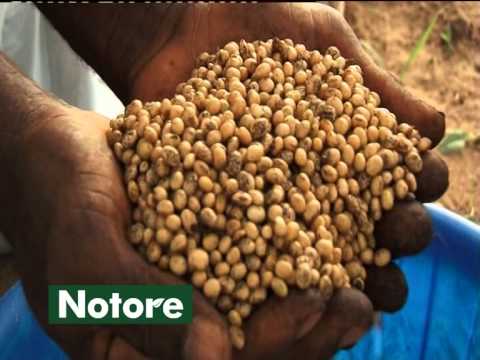Organic practices avoid investment on costly chemicals Ms. Rajareega at her farm in Sivaganga district, Tamil Nadu seen manufacturing the botanical pesticides.
 There is a growing body of evidence to suggest that in the past 4-5 decades there has been an excessive dumping of chemical toxins on the soil. As a result the soil has become barren and ground water toxic, in many places. Contrast this with organic inputs that are safe, non toxic, and cost much less. For example, if using chemical pesticides and fertilizers for growing a crop in a hectare works out to about Rs.6,000-7,000 the cost of growing the same crop using organic inputs may come to only about Rs.500 – Rs. 1,000, according to Ms. Rajareega of Raasi organic farms at Muthupatti village in Sivaganga district, Tamil Nadu.
There is a growing body of evidence to suggest that in the past 4-5 decades there has been an excessive dumping of chemical toxins on the soil. As a result the soil has become barren and ground water toxic, in many places. Contrast this with organic inputs that are safe, non toxic, and cost much less. For example, if using chemical pesticides and fertilizers for growing a crop in a hectare works out to about Rs.6,000-7,000 the cost of growing the same crop using organic inputs may come to only about Rs.500 – Rs. 1,000, according to Ms. Rajareega of Raasi organic farms at Muthupatti village in Sivaganga district, Tamil Nadu.
Lower cost
Even if some critics say that organic farming cannot provide the same high yields as chemical farming, the organic farmers argue that at least their land is safe; that they have not invested in buying the chemicals and increasing their cost of cultivation.“If you look at the suicides by farmers, then you will understand that all those farmers who committed suicides have built up huge debts.
The debts kept growing because of borrowing at high interest rates for buying these chemicals which promised to increase the yield. In the end, it only increased their debts,” she explains.
“If only farmers use safer and natural pest repellents and manures then where is the question of debt and suicides,?” she enquires. She has been using only organic manures and bio-repellents made from locally available resources.
Five leaf extract
For example she uses 5 different leaf extracts (eindhu ilai karaisal in Tamil) derived from Calotropis (called y erukku in Tamil), Jatropha curcas (kattu amanaku in Tamil), Neem (vembu in Tamil), Guduchhi/Amruth (seenthil kodi in Tamil), Chaste tree (nochi in Tamil), Malabar nut (adathoda in Tamil), Kalmegh (siriyanangai in Tamil), Clerodendron (peenarisanghu in Tamil) and Usil (arappu in Tamil). These plants are commonly found in all villages. About 1 kg of leaves from each plant is taken and powdered and then ground into a paste. It is then mixed with 5 litres of cow’s urine.
The concoction is then diluted in 5 litres of water and left undisturbed for 5 days. When required for using about 500 ml of this concoction is diluted in 10 litres of water and sprayed over the plants, she explains.
Ginger garlic extract
Another tried and proven mixture she uses is ginger garlic extract (called inji poondu karaisal in Tamil). About 1 gm of ginger and garlic each, 2gm of green chilli and 5 litres of cow’s urine and water are taken. The garlic, ginger and green chilli are ground into a paste and mixed with cow’s urine and water. After 10 days the mixture is filtered and used. The prescribed quantity is about 500 ml of this solution diluted in 10 litres of water which can be sprayed over the plants.
Ideal spraying time
The ideal time for spraying these karasals is during 6 am to 8.30 am and between 4 pm and 6.30 pm. Depending upon the soil, crop and other climatic factors the concentration can be raised or lowered. Farmers can contact their nearby organic farmers who are using these karaisals or can contact Ms. Rajareega for guidelines regarding the concentration.
Effective control
Both the above karaisals have been found effective in controlling leaf roller, thrips, mealy bugs, fruit, stem and bark borer, hairy caterpillar and aphids. Even if a farmer is not convinced about the benefits of organic inputs he can continue to grow his crops using chemicals, but at the same time he can set aside a small portion in his field to grow the same crop using organic inputs. By doing so he can find out for himself the cost benefit ratio. That itself can convince him of its efficacy.
Readers can contact Ms. Rajareega, Raasi organic farms, Muthupatti, via Kallal, A. Siruvayal (post), Sivaganga district, Tamil Nadu, email: rajareega@rediffmail.com, mobile: 9865-582142 and phone: 04565-284937.


